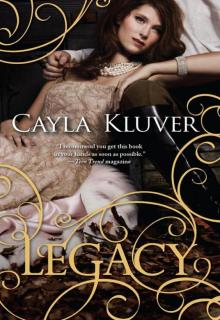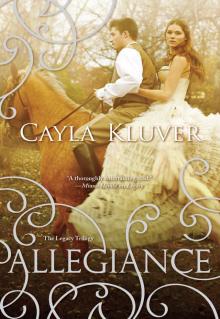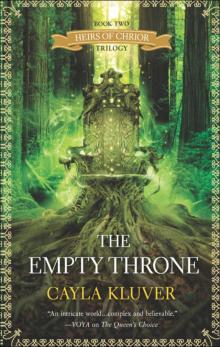- Home
- Cayla Kluver
Legacy Page 10
Legacy Read online
Page 10
A warm breeze caressed my cheeks as we stepped into the Central Courtyard, a welcome reminder that summer had arrived. It was late June, and though just yesterday it had been cool and refreshing outdoors, this morning it was sultry, with a promise of blazing hot weather later in the day.
Hytanican summers were notorious for sweltering days, with light rain often falling in the evenings. The weather was predictable in a most uncanny way, which was good for the crops grown by the farmers in the villages surrounding the walled city and ensured that the rolling hills that marked our western border lay draped in green.
We stayed outside for hours, until I felt faint from the heat and ready to abandon our mission, but Miranna wouldn’t hear of it.
“The minute you leave, Cannan will come marching up to those gates with the prisoner, and you will miss it.”
She was referring to the exterior gates that permitted entry into the courtyard. The gates were locked to commoners most hours of the day, open only for a short amount of time during which anyone who had not been banished from the palace grounds or the kingdom itself could seek counsel from the King.
“They’re approaching now,” Halias abruptly announced. “If you don’t want to be seen, you’d better hide—and not behind that cherry tree.”
He motioned to the thin trunk of a young tree that Miranna was moving toward as though it would conceal her.
My sister changed course, and she and I maladroitly crouched behind the lilac hedges, peering through the irregular gaps in the branches to where the stone path leading from the gates to the steps of the palace lay, dirt-free and so white from the sun’s rays that it was almost painful to view. Our bodyguards seemed to vanish, as I supposed they had been trained to do.
Drawn by shouts and the sounds of milling horses, our heads snapped toward the gates and we impatiently waited for them to open. Within a few minutes, they swung inward and Cannan strode between them, looking grim. He turned to wait for his troops to dismount, for no animals were permitted in the courtyard—a single spooked horse could damage its beauty. The mounts would be taken to the Royal Stables, where they would be fed and groomed while their riders attended to business.
My eyes roved over the scene before me until the movement of a particular soldier caught my notice. He was roughly pulling a man whose hands were tied behind his back off one of the horses. This soldier and another then approached Cannan, holding the bound man by his arms between them.
“That’s him!” Miranna hissed, gripping my wrist.
I could not see the prisoner’s face from where we were hidden, but he was wearing the white shirt and sleeveless brown tunic typically donned by Hytanican villagers, and had I not known he was Cokyrian, I never would have guessed it. Nothing about him that I could see would have set him apart from all the other villagers frequenting the streets and shops of our kingdom.
I slipped behind Miranna and, continuing to stoop, moved down the line of bushes to the far end in order to get a better glimpse of the man held captive between the large guards. As the gates closed and Cannan turned to lead his troops onward, I gained a more distinct view of the prisoner’s face. I stifled a gasp, for he was not a man, but a teenage boy. He held his head high, as though unafraid, but the way his eyes flitted between the guards at his sides and Cannan before him gave away his unease. His hair was thick and many shades of gold, the sun’s rays having colored it to their own content, and its darker undertone was a close match to his skin. It was cut about an inch below his ears, and his bangs, which were slightly shorter, fell haphazardly over his forehead.
Miranna, plainly astounded, moved to crouch next to me. “He can’t be any older than I am!”
My gaze swept the rest of the soldiers, and all thoughts of the Cokyrian youth left my mind as I caught the light but confident stride, the muscular frame, the twin double-edged blades sheathed at the hips, the untidy silver hair partially obscuring mysterious indigo eyes—London was there, walking at the forefront of a half dozen soldiers as if he were one of them.
“What is he doing here?” I asked aloud, more to myself than to my sister.
“Who?” Miranna queried, too spellbound by the young Cokyrian to notice anything else.
“London,” I responded, pointing.
Miranna’s gaze followed the invisible line stretching from my finger and landed on my former bodyguard, bewilderment to match mine breaking over her face. “What is he doing here?” she repeated.
With no available answer, I returned my attention to the captive, and it was then that I noticed his eyes. They were steel-blue, sharp and intense. Despite the youthful glow of his suntanned face, his eyes were cold, suggesting he had great experience in the world and was now expecting the worst.
I stooped lower as the troops passed, watching London stride toward the palace, oblivious to my presence, and an unexpected flood of emotions threatened to overwhelm me—regret, guilt, sorrow, shame and love for the man before me. The urge to run to him once again surfaced, and I had to look away, though Miranna continued to watch, entranced, until the soldiers had passed between the thick palace doors.
“Curious about London?” Destari’s deep, resonating voice startled us, and we wheeled around to see the pair of deputy captains crouching behind us.
Booted feet scraped against bark, and I turned my head to see Tadark tumble out of an oak tree, gracelessly landing on his rear end. He let out a wounded groan and was shushed by Orsiett, who was walking toward him.
“Making furry friends up in the tree, were you?” Halias jibed, his blue eyes alight.
“No,” Tadark grumbled. “I wanted to see what was going on.”
“Oh, now I understand.” Halias laughed. “You’re a scenery guard, not a bodyguard!”
“Halias, we’ve been mistaken all this time,” Destari added, unable to pass up the fun. “It’s not the royal family we’re supposed to protect, it’s the royal foliage.”
Tadark’s cheeks burned and he bitterly muttered, “Leave me alone. You’ve made your point.”
I watched the three guards in amusement, surprised to see Destari, who was usually quite serious, teasing the lieutenant much as London would have done, and it struck me that Tadark drew jests from people like a flower drew bees.
Destari returned his attention to me, and I suppressed my mirth in order to repeat my question.
“What is London doing here? Isn’t he banished from the palace grounds?” I forced out the words, on some level believing they would cease to be true if I refused to say them.
Destari opened his mouth to speak but was interrupted by Tadark’s moans as he inched closer to where the four of us sat, pulling himself along the ground in apparent agony.
“Are you trying to make that inchworm feel good about itself?” Halias ridiculed, pointing to a slow-moving specimen that was nonetheless crawling faster than Tadark across the grass.
Tadark made a noise that sounded like humph, and continued to scoot along.
“I think I broke something,” he mumbled.
Reaching another tree, he sat up and leaned against its trunk, then plucked a blade of grass, fiddling with it between his fingers. Orsiett stopped and sat down by Tadark, presumably too intimidated by the older guards to join us.
Destari chuckled, noticing as we all were that Tadark was monitoring the greenery rather than his charge, more or less proving Halias’s statement to be true.
“You wanted to know about London,” Destari finally said.
I nodded.
“He’s here because he is the one who discovered the Cokyrian in the city. He went to the captain at his home and asked that in exchange for handing over the prisoner, he be allowed an audience with the King.”
I made some noise of affirmation, for everything suddenly made sense to me, but Miranna was confused enough to pursue the subject.
“But how did he find that boy when no one else could, when the search of the kingdom by Cannan’s soldiers turned up nothing?”
<
br /> Halias and Destari glanced at each other, trying to judge how much they should tell us. At last Destari spoke.
“During the war, London saw much of the Cokyrians. I suppose he developed a keener eye for their mannerisms than the average foot soldier.”
Miranna nodded, satisfied with this explanation. Unbeknownst to the guards, however, and thanks to my mother, I was mindful of the real reason London had greater knowledge of Cokyri than did anyone else.
Suspicion and apprehension rippled through the palace that afternoon like the swift rapids of the river, but I cared not. I waited outside the doors to the Throne Room, unintelligible voices barely reaching my ears.
Miranna and I had eaten lunch together, then she had left, for the day was getting late and she had other tasks to undertake. After we had parted ways, I entered the antechamber and now paced ceaselessly, too anxious to sit down or stand still. Destari leaned against the wall next to the door to the Grand Entry in London’s characteristic posture, while Tadark stood in the middle of the room, shifting his weight from foot to foot. Every time he winced in pain, I remembered with some sympathy his fall from the tree or, more to the point, his not-so-gentle landing.
Though neither spoke, I wished I could be alone. Even the dull sound of Tadark’s fidgeting in the otherwise quiet room was a distraction to me. While I very much needed to think, I seemed to have lost the ability to do so.
The time I might have had for reflection was cut short by the creaking of the Throne Room doors as they were pulled open from the inside. London stepped between them and immediately took note of me. His reaction to my presence, however, was difficult to discern.
“Princess,” he greeted me, halting and tilting his head in respect.
“Please, let’s not start where we left off,” I beseeched, wanting to avoid the pattern of our earlier quarrel.
An awkward pause followed, the only sound the breathing of the others in the antechamber, but I gratefully realized that the lack of a heated reply meant London’s hurt had eased somewhat.
“You spoke with my father?” I chanced.
London’s only answer was a nod.
“I hear you made a good catch,” I timidly continued. “Is he pleased?”
“He is.”
“And?”
“Your father is not a forgiving man.”
I cast my eyes to the stone floor. I knew it had been a fool’s hope that London might be given his life back based on this one deed, but against my will, my heart had become set upon it. It was the only thing that could possibly heal the rift between us, but any such hope had now been shattered by my father’s obstinacy and mistrust. There was only one thing I could think to say.
“And you, London? Are you a forgiving man?”
“Some might say so.” He said this in a way that was very near lighthearted, as if he meant to make me feel better. Then his tone darkened almost imperceptibly. “But some things are not so easily forgiven.”
I managed to hold his gaze, though my head felt heavy with shame, and I searched his familiar face for something more.
“London…I’m sorry.” I did not elaborate, hoping my simple words would suffice.
“I know,” he said, and an uneasy silence fell between us.
His eyes flicked to Destari, who was no longer leaning against the wall, probably having straightened the moment my former bodyguard had come into the room.
“I must take my leave now,” London said, then he crossed to his friend to say a few words before stepping into the Grand Entry Hall.
London departed, and a sinking feeling of uncertainty as to when I would next see him overwhelmed me. I waited for a chance to talk to Destari, for he knew London better than anyone.
“Will he ever forgive me?” I moaned when Destari looked at me.
“I cannot say,” he said, black eyes murky and unrevealing. “London does not trust easily, and he does not forgive easily when his trust has been betrayed.”
I pondered Destari’s words for a moment, convinced he was hiding something.
“You speak as though you know of some other betrayal. Help me to understand him so that I can learn how best to seek his pardon.”
Destari glanced warily at Tadark, clearly not wanting to discuss London in his presence.
“Tadark,” I said. “Remove yourself to the Grand Entry Hall. We will be but a minute.”
Tadark hobbled from the room without comment, shooting the deputy captain a sullen look on his way out.
Destari cautiously assessed me, trying to decide whether he should confide in me.
“I already know London was a prisoner of the Cokyrians during the war,” I disclosed, hoping to persuade him. “If this relates to that time, you needn’t keep anything from me.”
Destari’s heavy eyebrows rose, and I knew he had expected me to be ignorant of London’s history. After another moment of deliberation, he capitulated.
“The incident of which I am about to speak is related to that period in his life.”
“Go on,” I urged.
“Before London was imprisoned by the Cokyrians, he was betrothed to a young woman of noble birth.”
Destari halted at my stunned expression. While I knew London had never married, I had always assumed the reason was that his devotion to the military had left little time for a personal life. Destari’s revelation reconfirmed how paltry was my knowledge of the man, and a crushing sense of remorse hit me at the thought that I had always been too self-absorbed to even be curious. I took a deep, steadying breath, waiting for my bodyguard to elaborate. With a measure of concern, he stepped forward and gripped my elbow, directing me to an armchair. When I had seated myself, he resumed his tale, voice strangely hollow.
“A couple of months into his captivity, the parents of his betrothed determined to have her marry another, believing London to be dead. She had already been pledged to him for a year and a half, and her parents worried that at age twenty-two, her marriage prospects were becoming limited. She at first refused, for she was very much in love with London, but in the end, acquiesced to her parents’ wishes. She was married to a much older man about two months before London’s escape.
“As I assume you know, London was deathly ill upon his return to Hytanica and did not immediately learn of any of this. When he had recovered enough to communicate, he began to ask for her, and it fell to me to tell him of her circumstances.
“He did not take the news well, and I feared he might not be strong enough to survive this second trial. He was withdrawn for a long time, and in truth never fully came back to himself. He is more guarded now than he once was.”
Destari sounded weary, as if just telling the story were exhausting.
“He has not, since that time, permitted himself to form deep attachments. Or at least, he has tried not to form strong attachments, but he did not count on the bond he would develop with you while being your lifelong bodyguard.” Destari paused, sighing heavily before he finished. “London never really forgave his betrothed for doubting his return, and I don’t know that he will ever really forgive you for doubting his loyalty.”
I stared numbly at Destari, too overwhelmed by London’s tragic past to respond. Finally regaining the ability to speak, I asked, “Who was she?”
Destari frowned, then shook his head. “That is not for me to say. Perhaps someday London will be inclined to tell you.”
I continued to stare at him, biting my lip while I debated whether to ask him the question upon which I had unendingly dwelt since London’s dismissal from the military. In the end I risked his anger.
“We both know London recognized the High Priestess. Do you think he released her?”
As I had expected, Destari glowered at me.
“I don’t know whether he released her or not, nor do I care. London has always acted in Hytanica’s best interests, and if he did release her, he had good cause. He is not and never has been a traitor, and I would follow him without hesitation, even to my de
ath.”
I shrank under his glare, feeling pitiful, for I did not have the same ability to take things on faith.
Destari and I left the antechamber in weighty silence, to be rejoined by Tadark in the Grand Entry. I could tell by Tadark’s expression that he was unhappy about having been excluded from our conversation, but he simply fell into step with us. I returned to my quarters to eat dinner, then prepared for bed, emotionally drained. I lay in the darkness, beginning to drift toward sleep while listening to Destari and Tadark’s faint bickering. The only thing I could make out was Destari saying, “My sofa, your armchair.”
CHAPTER 10
CLANDESTINE MEETING
I AWOKE LATER THAN USUAL THE FOLLOWING morning and dressed with Sahdienne’s assistance. When I entered the parlor, Tadark was standing near a serving tray that had been set on a small table, as though he had been ordered to guard the Princess’s breakfast instead of the Princess herself. Destari’s looming form, however, was absent. Upon Sahdienne’s departure, I took the tray and went to sit in one of the gold velvet armchairs.
“Where is Destari?” I asked, removing the cloth that covered my food to keep it warm, the delicious aroma of freshly baked bread and scrambled eggs wafting up to greet me.
“He was sent for by the Captain of the Guard early this morning,” Tadark responded, still lingering by the table.
“For what purpose was he summoned?” I pressed, concerned in light of recent happenings.
“I don’t know—I wasn’t told anything.” He tried to act nonchalant, but I could tell he was bothered by the fact that he had once again been left out of a meeting.
I shrugged and continued to eat my breakfast, hoping to conceal my building and insatiable hunger for palace politics.

 Legacy
Legacy Allegiance
Allegiance The Queen's Choice
The Queen's Choice Sacrifice
Sacrifice The Empty Throne
The Empty Throne